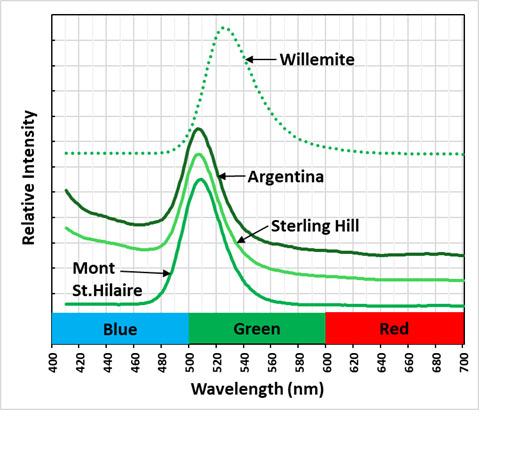Genthelvite from Argentina
Contributed by: Michael Crawford
Date: Jun 13th, 2025
Locality: El Criollo Mine, Cerro Blanco pegmatite district, Tanti, San Roque District, Punilla Department, Córdoba Province, Argentina (See on Mindat)
Size: 5.5 x 10 cm
Description:
This is a genthelvite (Be3Zn4(SiO4)3S) specimen from the El Criollo Mine, located in the Cerro Blanco pegmatite district, Tanti, San Roque District, Punilla Department, Córdoba Province, Argentina. The specimen features blue genthelvite and quartz within a vein that intersects a matrix of specular hematite. The distinctive blue daylight coloration of this genthelvite is attributed to cobalt impurities.
The genthelvite exhibits bright green fluorescence under longwave UV illumination, lacks midwave fluorescence, and demonstrates weak green fluorescence under shortwave UV illumination. Close-up images reveal the presence of another mineral that fluoresces red under longwave UV light, which is associated with the genthelvite crystals. This red fluorescent mineral only shows fluorescence in longwave UV illumination. Helvine (Be3Mn2+4(SiO4)3S), which has a similar chemical composition to genthelvite but contains manganese instead of zinc, can also exhibit red fluorescence under longwave UV light.
A comparison of this genthelvite specimen from Argentina with specimens from the Passaic Pit, Sterling Hill Mine, Ogdensburg, New Jersey, and Mont St. Hilaire, Quebec, Canada, indicates that the longwave emission spectra of genthelvite from these locations have a similar signature. All genthelvite spectral peaks exhibit maximum emission at 508 nm, which occurs at a shorter (bluer) wavelength compared to willemite (Zn2SiO4) emission at 525 nm. The green fluorescence in both genthelvite and willemite is activated by manganese (Mn2+) substituting for zinc (Zn2+) in both minerals.
Summary of luminescence responses:
Genthelvite (Mindat) (RRUFF)
- Fluorescence under Longwave (365nm LED) UV light: Green
- Fluorescence under Longwave (365nm LED) UV light: Red





